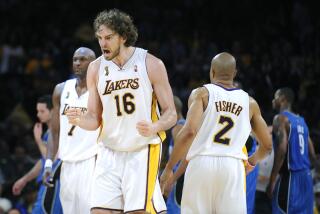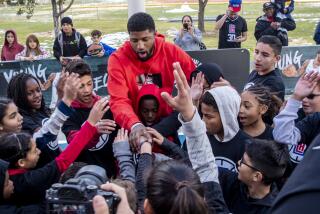The Final Frontier : New Chinese League Provides U.S. Exports With a Fresh Perspective While Giving Home-Grown Players and Fans Chance to Learn the Game NBA-Style
- Share via
BEIJING — “The round ball’s done some good things for Joe,” says veteran basketball coach Joe Weakley, summing up his career.
He built his Crenshaw High-based “Joe Weakley’s Run, Shoot and Dunk” summer camp into an important training site where inner-city kids have received guidance from NBA pros. As an assistant to Willie West, he helped Crenshaw win four state championships. Later, he coached the Los Angeles Southwest College Cougars back to life.
But in recent years, Weakley, 58, had been feeling burned out on basketball. He says his horoscope in The Times predicted an overseas job.
This season, Weakley finds himself coaching the Beijing Lions, one of eight teams in the fledgling Chinese New Basketball Alliance (CNBA).
“I never imagined I’d be walking the Great Wall of China,” he said recently.
The challenge of building a team in China has given him a fresh perspective on his work. Teaching and motivating his new crew required him to dig within himself, “to bring out something from within.”
In return, he said, Beijing has “opened its arms and shown a lot of love for the American ballplayers, especially me.”
“When I leave, I think I’ll be a different man.”
The league is one of the newest and most far-flung of the foreign leagues to which the U.S. exports its overflowing pool of basketball talent.
For example, at age 37, former Laker Mike McGee is just hitting his stride with the Lions. “I couldn’t chase those young guys back there in the NBA. The pace here isn’t so bad, and I can rely on my knowledge and experience,” he said. McGee is among the highest-paid players in the new league. (Promoters don’t disclose salaries but say they are tied to performance.) He scored 33 points in his first game.
A first-round draft pick by the Lakers from Michigan in 1981, McGee played on two of their NBA championship teams and set an NBA record for the highest field-goal percentage for a guard, .519 in 1983-84. He went on to play in Atlanta, Sacramento, New Jersey and later in Italy. He was touring with Magic Johnson’s All-Stars when team members suggested he try the new league in China.
In the future, McGee envisions doubling as player and coach, like his Chinese teammate Sun Fengwu. Sun, a 34-year old former player for China’s national team, plays guard and is the team’s Chinese coaching counterpart to Weakley. CNBA teams have one American coach and one or more Chinese coaches.
Weakley and Sun have their work cut out for them. The Lions split their first 10 games.
The league limits each team to two foreign players on the court at any time. Two former Harlem Globetrotters, Maurice Barnett and Tyrone Doleman, and a former touring player with Magic Johnson, Michael Hudson, also play.
Despite a team translator and the nonverbal communication the Chinese and Americans have established, the language barrier is as much an obstacle as an amusement. While they’re learning each other’s slang, most of the players communicate through charades.
And, Sun observes, “sometimes our different understanding of basketball causes friction.”
But both sides are learning from each other, going beyond just language and basketball.
During one afternoon practice, Hudson was sitting on the sidelines with several long needles stuck in his swollen knee. “Oh! Ah!” he yelped in mock agony as the team’s Chinese acupuncture doctor passed electricity through the needles. Hudson said the acupuncture helped to reduce the swelling.
Even the Chinese and American referees are learning. The league uses NBA rules, which prohibit zone defense, have less time on the shot clock and a longer distance for a three-point shots than international rules, which the other league in China, the Chinese Basketball Assn., uses.
The NBA rules, Weakley asserts, are what give Chinese fans a faster, higher-scoring, more physical game, with, as he puts it, “more bumpin’ and hackin’.”
Chinese spectators respond wildly to this spectacle. The young fans roll in “waves,” like American fans when their team scores.
They have opinions too. “The foreign players control the ball all the time; they make all the shots,” complained Deng Koulan, a People’s University law student. The official Beijing TV news added its disapproval, deploring the “supporting role” to which the Chinese players have been relegated and admonishing the Chinese athletes to improve their game.
Weakley says his Chinese players are learning quickly. He points, for example, to Wang Li, a skinny 23-year-old guard whose fastbreaking, sharpshooting style have made him a key player. Weakley says he hopes that in the next few years, players like Wang will help the CNBA at least reach the level of the Continental Basketball Assn.
Andy Jay, chief operating officer at Spectrum, the league’s organizers and promoters, said the CNBA already has gone a long way toward popularizing basketball in China, where sports traditionally have been dominated by soccer, volleyball, badminton, table tennis--and kung fu.
Jay said he hopes the CNBA will expand to include teams from the greater China region, including Hong Kong and Taiwan, after the former reverts to Chinese sovereignty next year.
“It’s a huge country, and right now we’re only in eight cities,” Jay said.
These plans may be modest, but then China has only recently built the infrastructure to accommodate a world-class league. The Lions’ team members are lucky compared to athletes in other Chinese cities. They live in a massive Holiday Inn complex with 10 restaurants, a disco, bowling alleys and a health club. On weekends, they even go to McDonald’s.
More to Read
Go beyond the scoreboard
Get the latest on L.A.'s teams in the daily Sports Report newsletter.
You may occasionally receive promotional content from the Los Angeles Times.










